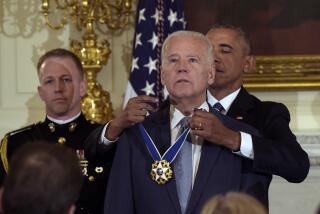Deficit talks strain Obama’s bipartisanship goals
- Share via
Reporting from Washington — President Obama took office with a promise to unite warring political factions in Washington, but his efforts to forge a broad deficit reduction plan and avoid a federal default may make him another casualty of those same toxic forces.
Obama has pushed congressional leaders from both parties to set aside partisan differences. He has urged them to pass a sweeping plan that, he says, would cut trillions of dollars from the nation’s debt and shore up Social Security, Medicaid and Medicare for years to come.
White House aides believed an achievement on that scale would prove that Obama could overcome the acrimony that has crippled the political process, and help his standing with independent voters who are at the heart of his 2012 reelection strategy.
Instead, after negotiations appeared to collapse Friday night, Obama’s options narrowed. While both sides resumed talks Saturday, a long-term bipartisan bargain still looked elusive. It’s not even clear whether the president can prod Congress to do the bare minimum: raise the debt ceiling by Aug. 2 to avert a default that would roil the global economy.
Inside the White House, the frustration was palpable. One aide sat glumly with a spreadsheet, looking at a column summarizing more than 30 negotiating points with Republicans. The differences had dwindled to three. The sides were that close, he said.
But if no solution emerges in time to avoid a default, Obama may revert to a more partisan role rather than try to mediate between the parties.
After House Speaker John A. Boehner (R-Ohio) refused to answer Obama’s phone call Friday, the president’s staff questioned whether Boehner was prepared to stand up to the most conservative voices in the GOP caucus. They believe Obama has risked the ire of many Democrats for offering to cut future spending for Medicare, Medicaid and Social Security, and they’d like Boehner to do the same by agreeing to raise revenues.
Bipartisanship is central to the Obama brand. His breakthrough moment on the national scene came in his address to the Democratic National Convention in 2004 when he rejected the idea that the country had cleaved into political factions.
But in the 2010 midterm election, Obama went all in for the Democrats. He said Republicans should sit in the “back seat” after driving the economy into a “ditch.”
After his party lost the House, Obama reconsidered his approach. He invited several independent political operatives and analysts to the Oval Office for private consultations.
One who came was Matthew Dowd, a former advisor to President George W. Bush who later broke with him. Dowd won’t reveal what he told Obama, but he said in an interview that the president had yet to forge the kind of personal bonds with Republican leaders that might prove helpful in a crisis.
Obama’s efforts in this regard have been sporadic. He plays golf with the same group of White House aides, dines most nights with his family, and vacations with old friends. There is little room for outsiders.
Last month he opened up the inner circle just a crack. He invited Boehner to join him for a round of golf on the course at Andrews Air Force Base. White House aides talked of inviting congressional leaders to Camp David in hopes that might put them in a more conciliatory mood. When word leaked out, Boehner and other GOP lawmakers said they didn’t want to go.
“He has under-utilized the social power of the presidency,” Dowd said. “So when things like this happen, he hasn’t built the relationships. One golf game with a series of photo ops over two years won’t be helpful. The best thing for you is enduring relationships, not transactional relationships. And he’s focused on transactional relationships.”
When he faced the cameras Friday night, Obama brushed aside a question about his relationship with Boehner, saying their dealings were “cordial.” Then he vented his frustration with the Republican negotiating position.
He said that one of the questions “that the Republican Party is going to have to ask itself is: Can they say yes to anything?”
Republicans still have time to say yes. On Saturday afternoon, Boehner called a meeting with other lawmakers to find a way forward.
The White House was not invited.
More to Read
Sign up for Essential California
The most important California stories and recommendations in your inbox every morning.
You may occasionally receive promotional content from the Los Angeles Times.










